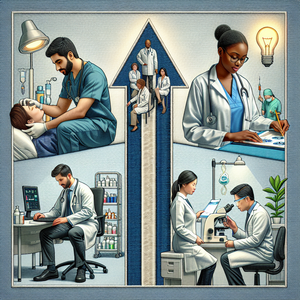
Exploring the Top 20 In-Demand Healthcare Careers in 2024: Salaries, Growth, and Pathways
As we enter 2024, the healthcare sector continues to play a vital role in economic stability and growth. With an ever-increasing demand for skilled professionals, the industry presents a wide array of career paths that not only offer financial rewards but also the opportunity to make a significant impact on the lives of others.
Job Summaries:
Nurse Practitioner (NP):
- Nurse Practitioners play a critical role in both primary and specialized healthcare.
- Responsible for assessing, diagnosing, and treating patients.
- Typically requiring a Master’s or Doctoral degree in nursing along with national certification and licensure.
- NPs earn an average salary of $121,610.
- The role is expected to see strong demand as access to healthcare services becomes increasingly essential.
Physician Assistant (PA):
- Physician Assistants work under the supervision of physicians to deliver diagnostic, therapeutic, and preventative care.
- A master’s degree from an accredited PA program and certification from the NCCPA are necessary.
- The average salary for Physician Assistants is $126,010.
- With healthcare facilities expanding, rapid job growth is anticipated in this profession.
Speech-Language Pathologist (SLP):
- SLPs focus on assessing and treating communication and swallowing disorders.
- Developing personalized treatment plans.
- A Master’s degree in speech-language pathology and state licensure required.
- The average salary is $80,000.
- The growing awareness of communication disorders is driving increased demand in this field.
Occupational Therapist (OT):
- Occupational Therapists assist individuals in achieving independence through tailored interventions.
- This role requires a Master’s degree and state licensure.
- Average salary is $86,000.
- Demand remains strong, particularly in rehabilitation settings.
Physical Therapist (PT):
- Physical Therapists facilitate recovery from injuries through exercise programs and hands-on therapy.
- A Doctor of Physical Therapy (DPT) degree and licensure are mandatory.
- The average salary of a Physical Therapist is $89,000.
- The demand for Physical Therapists is high, especially in rehabilitation centers.
Medical and Health Services Manager:
- These professionals oversee healthcare facilities or departments, ensuring efficient operations and compliance with regulations.
- A bachelor’s degree in health administration or a related field is typically required.
- They earn an average salary of $104,000.
- Their role is increasingly vital as the healthcare landscape evolves.
Veterinarian:
- Veterinarians diagnose and treat animal health issues.
- A Doctor of Veterinary Medicine (DVM) degree is required.
- National examination for licensure is necessary.
- The average salary for veterinarians is $102,000.
- The demand for veterinarians remains steady due to the importance of animal health.
Genetic Counselor:
- Genetic Counselors provide support for patients undergoing genetic testing.
- They assess risks related to inherited conditions.
- This role requires a Master’s degree in genetic counseling.
- The average salary is $83,000.
- The relevance of this profession is growing alongside advancements in genetic testing.
Radiologic Technologist:
- Radiologic Technologists perform diagnostic imaging procedures while ensuring patient safety.
- An associate degree in radiologic technology and state licensure are necessary.
- The average salary is $63,000.
- Demand is expected to rise with advancements in imaging technology.
Biomedical Engineer:
- Biomedical Engineers design medical devices
- Collaborate with healthcare professionals to solve medical challenges
- A bachelor’s degree in biomedical engineering is typically required
- Average salary of $96,000
- This field is expanding rapidly due to technological innovations in healthcare.
Health Information Manager:
- These managers oversee the management of patient health information, ensuring accuracy and compliance with regulations.
- A bachelor’s degree in health information management is usually required, with an average salary of $98,000.
- Their role is increasingly essential in managing electronic health records.
Pharmacist:
- Pharmacists dispense medications and counsel patients on health management.
- A Doctor of Pharmacy (Pharm.D.) degree and state licensure are required.
- The average salary of pharmacists is $128,000.
- The demand for pharmacists remains strong across various healthcare settings.
Dental Hygienist:
- Dental Hygienists focus on preventive care and educating patients about oral health.
- An accredited dental hygiene program and state licensure are required.
- The average salary for dental hygienists is $77,000.
- Growing awareness of oral health's impact on overall health drives demand for this profession.
Respiratory Therapist:
- Respiratory Therapists assess and treat patients with breathing disorders.
- An associate’s degree in respiratory therapy and licensure are required.
- They earn an average salary of $63,000.
- Demand is rising due to the need for chronic respiratory condition management.
Clinical Laboratory Technician:
- Clinical Laboratory Technicians conduct tests on patient samples to assist in disease diagnosis.
- An associate degree in clinical laboratory science is typically required.
- The average salary is $55,000.
- Their role is crucial for providing timely test results.
Medical Assistant:
- Medical Assistants support healthcare providers with both administrative and clinical tasks.
- A high school diploma and certification are commonly required.
- The average salary is $37,000.
- This entry-level role opens pathways into various healthcare careers.
Medical Coding Specialist:
- Medical Coding Specialists translate healthcare services into standardized codes for billing purposes.
- A certificate in medical coding is typically required.
- The average salary of a Medical Coding Specialist is $45,000.
- Their work is essential for the financial sustainability of healthcare facilities.
Midwife:
- Midwives provide care for expectant mothers, focusing on natural childbirth.
- A certified midwifery program and licensure are necessary.
- The average salary of a midwife is $108,000.
- Their role is vital in supporting maternal health.
Phlebotomist:
- Phlebotomists draw blood for tests and transfusions, ensuring patient comfort.
- A high school diploma and certification are typically required.
- The average salary is $37,000.
- This role is crucial for obtaining diagnostic information in healthcare.
Home Health Aide:
- Home Health Aides assist patients with daily activities in home settings.
- A high school diploma is often sufficient.
- On-the-job training is provided.
- Average salary is $30,000.
- Their support is vital for the elderly and disabled populations.
These healthcare careers present a wealth of opportunities for those looking to enter a deeply rewarding field. With many organizations actively hiring, now is an ideal time to explore current openings and take the next step in your healthcare career journey. Whether you are drawn to direct patient care or administrative roles, the healthcare sector is brimming with potential to make a difference in the lives of others.
Explore More Jobs

